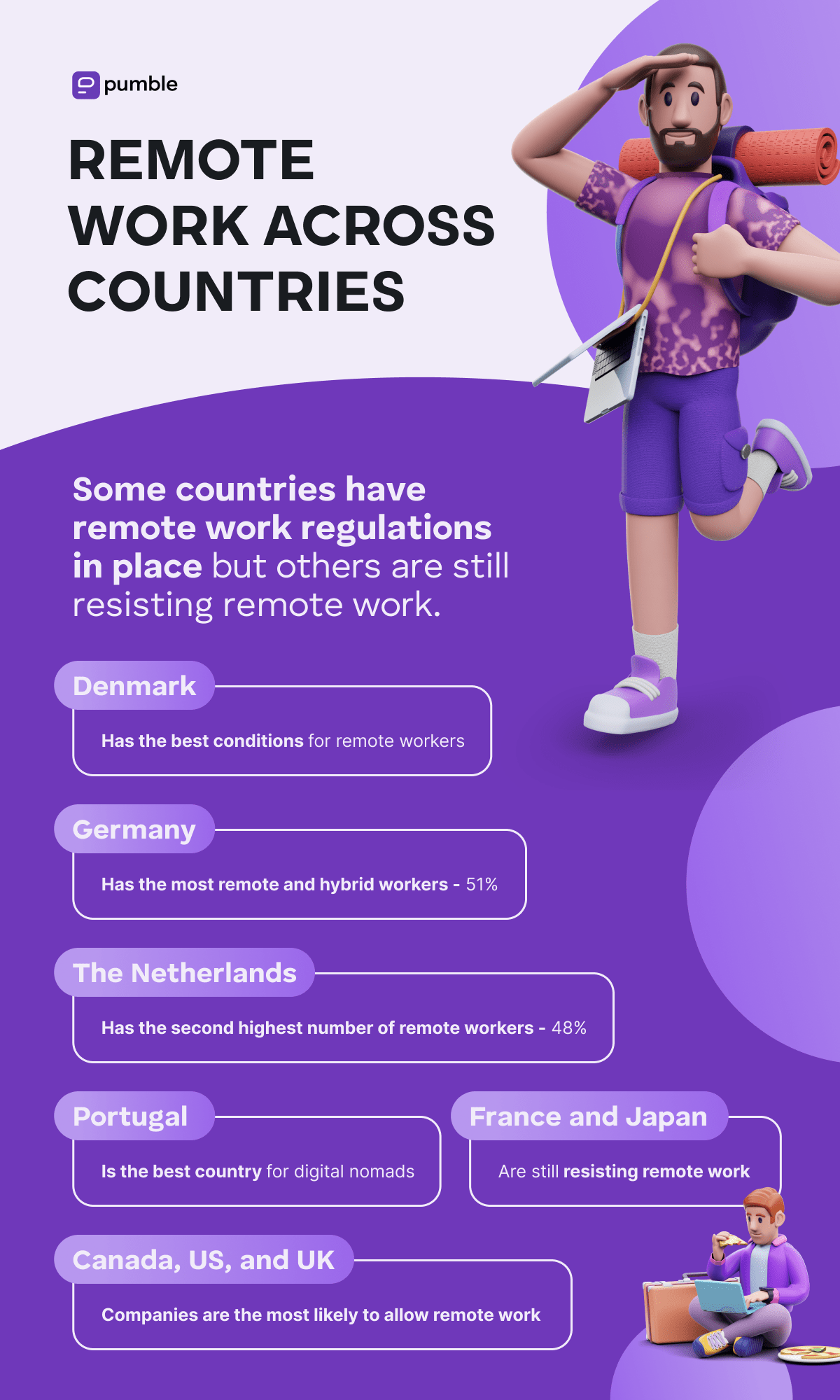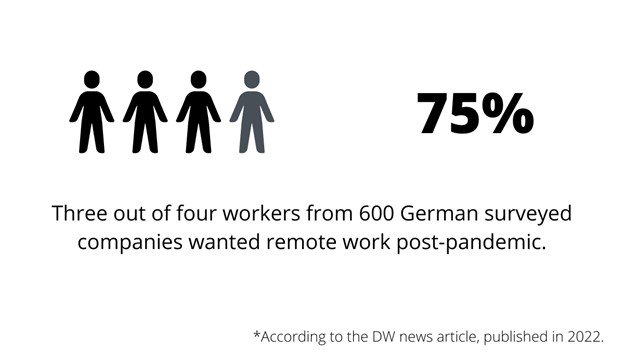Overview of Remote Work in Germany for 2025
Current Landscape of Remote Work in Germany
Germany has truly embraced the remote work revolution. The country's robust digital infrastructure and focus on work-life balance have made it a leader in this modern approach. Businesses are refining hybrid models and prioritizing employee well-being.
Remote work is no longer a temporary solution. It is a strategic advantage for companies and employees alike. This shift is reshaping traditional office environments in Germany.
Key Factors Influencing Remote Work in Germany
Several factors are driving the popularity of remote work in Germany. A strong emphasis on work-life balance is a major contributor. Employees value their personal time, and remote or hybrid work offers more flexibility.
Technological advancements also play a crucial role. Reliable internet connectivity, secure remote access tools, and advanced communication platforms enable seamless remote work experiences. Government initiatives to improve digital infrastructure further support this trend.
Advantages of Working Remotely in Germany
Quality of Life and Work-Life Balance
Germany consistently ranks high in quality of life indices. Remote work enhances this by allowing employees to better manage their personal and professional lives. This balance leads to reduced stress and increased job satisfaction.
Working remotely allows individuals to integrate work with personal commitments more effectively. This can include childcare, pursuing hobbies, or simply enjoying a more relaxed pace of life. The flexibility to work from anywhere in Germany adds to the appeal.
Technological Infrastructure Supporting Remote Work
Germany boasts a robust technological infrastructure. High-speed internet is widely available, even in many rural areas. This connectivity is crucial for remote workers who rely on stable internet for their daily tasks.

Companies are investing in advanced tools to support remote work. These include secure remote access software, collaboration platforms, and project management tools. Such investments ensure that remote teams can operate efficiently and securely.
Cultural Diversity and Inclusivity
Germany's diverse culture is a significant draw for remote workers. Major cities like Berlin, Munich, and Hamburg are known for their vibrant expat communities. This multicultural environment fosters inclusivity and offers a rich social experience.
Remote work allows individuals to experience Germany's cultural diversity without being tied to a specific location. This flexibility enables them to explore different regions. They can immerse themselves in local traditions and lifestyles.
Remote Work Opportunities in Germany for 2025
Growing Industries and Job Markets
Germany's strong economy offers diverse remote work opportunities across various industries. The tech sector, in particular, is booming. It has numerous remote positions in software development, cybersecurity, and data analytics.
Finance, marketing, and customer service also offer many remote roles. The growth of e-commerce and digital services further expands the job market. This provides ample opportunities for remote workers.
Companies Embracing Remote-First Models
Many German companies are adopting remote-first models. This approach prioritizes remote work as the default. It allows employees to work from anywhere.
This shift offers greater flexibility and attracts a wider talent pool. Companies like Siemens, SAP, and various startups are leading this trend. They provide remote work options to enhance employee satisfaction and productivity.
Availability of Remote Job Listings
Finding remote job listings in Germany is becoming easier. Websites like LinkedIn and Euremotejobs.com regularly feature remote positions. Specialized job boards for remote work also list numerous opportunities.
Networking through professional platforms and expat groups can help uncover hidden job opportunities. Attending virtual job fairs and industry events can also connect job seekers with potential employers.
Cost of Living for Remote Workers in Germany
Overview of Living Expenses
Living expenses in Germany vary by region. Housing costs make up a significant portion of the budget. Utilities, food, transportation, and leisure activities also contribute to monthly expenses.
On average, remote workers can expect to spend a considerable amount on rent or mortgage payments. According to N26, housing and energy costs constitute about 37% of the average household budget. Food and groceries account for approximately 15%.
Comparison of Costs in Major German Cities
Housing costs differ significantly among major German cities. Munich and Frankfurt are among the most expensive. Berlin offers a relatively moderate cost of living compared to other European capitals.
| City | Average Monthly Rent (1-Bedroom Apartment) |
|---|---|
| Munich | €1,500 |
| Frankfurt | €1,500 |
| Berlin | €1,200 |
| Hamburg | €1,200 |
| Cologne | €1,000 |
Smaller cities and rural areas generally offer lower living costs. This can be an attractive option for remote workers seeking affordability.
Tips for Budgeting as a Remote Worker
Creating a detailed budget is essential for managing finances as a remote worker. Tracking monthly income and expenses helps identify areas for potential savings. Utilizing budgeting apps and tools can simplify this process.

Choosing affordable housing options, such as shared apartments or living outside city centers, can reduce housing costs. Cooking at home more often and using public transport instead of owning a car can also lead to significant savings. It's also wise to take advantage of discounts.
Best Cities in Germany for Remote Work in 2025
Berlin: The Creative Hub
Berlin is a magnet for digital nomads due to its vibrant creative scene and relatively low cost of living. The city offers numerous co-working spaces like betahaus and Factory Berlin. These spaces foster collaboration and networking.
The city's diverse neighborhoods, such as Kreuzberg and Friedrichshain, offer unique cultural experiences. Berlin's extensive public transport system makes it easy to get around. The abundance of parks and recreational areas adds to its appeal.
Munich: The Business Center
Munich is known for its strong economy and high quality of life. The city is home to many multinational corporations. It offers excellent opportunities for professionals in tech and finance.

Co-working spaces like Werkstatt and Mindspace provide inspiring work environments. Munich's efficient public transport and proximity to the Alps make it attractive for those who enjoy outdoor activities. The city is also one of the safest in Germany.
Hamburg: The Port City
Hamburg offers a unique blend of maritime charm and modern innovation. The city's moderate cost of living and excellent public transport make it appealing for remote workers. Internet speeds are generally over 100 Mbps.
Co-working spaces like Mindspace and Co-Work provide inspiring environments for freelancers. Hamburg's cultural scene and numerous parks offer a balanced lifestyle. The freelancer visa is also available.
Frankfurt: The Financial Powerhouse
Frankfurt is Germany's financial center, attracting professionals from around the world. The city offers excellent job opportunities in finance and tech. Internet connectivity is outstanding, with speeds often exceeding 200 Mbps.
Co-working spaces like Legacy and Co-Work Frankfurt cater to freelancers and remote workers. Frankfurt's multicultural vibe and numerous cultural events provide a rich social experience. The city's efficient public transport makes commuting easy.
Other Notable Cities for Remote Workers
Cologne offers a blend of historical significance and modern vibrancy. Stuttgart is known as the automotive capital, with opportunities in engineering and manufacturing. Düsseldorf is renowned for its fashion and arts scene.
These cities provide various lifestyle benefits, including efficient public transport, cultural events, and green spaces. Each city has its unique charm. It caters to different preferences and professional needs.
Visa Requirements for Remote Workers in Germany
Overview of the German Remote Work Visa
Germany offers a specialized visa for freelancers and remote workers. The "Freiberufler" visa allows non-EU citizens to live and work in Germany. This visa is ideal for those who can sustain themselves financially through remote work.
Applicants must demonstrate their professional qualifications and provide evidence of sufficient income. This visa can be a pathway to long-term residency. It offers an opportunity to integrate into German society.
Application Process and Necessary Documentation
The application process for the German remote work visa involves several steps. Applicants must first gather all necessary documents. These include a valid passport, proof of health insurance, and evidence of financial stability.
Applicants need to complete the visa application form and submit it to the German embassy or consulate in their home country. Providing a detailed business plan and letters of intent from potential clients can strengthen the application. The processing time can vary.
Tips for Navigating Bureaucracy for Foreign Workers
Navigating German bureaucracy can be challenging for foreign workers. It is essential to prepare all documents meticulously and follow the guidelines provided by the German authorities. Seeking assistance from immigration lawyers or relocation services can be beneficial.
Understanding the local regulations and requirements can help avoid delays and complications. Building a good relationship with local authorities and being proactive in communication can also facilitate the process. Patience and persistence are key when dealing with bureaucratic procedures.
Future Trends in Remote Work in Germany
Sustainability and Remote Work Practices
Remote work is increasingly aligned with sustainability goals. By reducing the need for commuting, remote work helps lower carbon emissions. It contributes to a greener environment.
Companies are adopting eco-friendly practices in their remote work policies. This includes promoting paperless operations and encouraging the use of renewable energy. These initiatives support Germany's broader environmental objectives.
Impact of Remote Work on Local Economies
Remote work can have a positive impact on local economies. It allows individuals to live in smaller towns and rural areas while working for companies based in major cities. This can help distribute economic growth more evenly across the country.

Remote workers often contribute to local businesses and communities. Their spending on housing, food, and services supports local economies. This can lead to increased job opportunities and economic development in these areas.
Predictions for Remote Work Evolution in 2025 and Beyond
Remote work is expected to continue evolving in Germany. Hybrid work models, combining remote and in-office work, are likely to become the norm. This approach offers flexibility while maintaining the benefits of face-to-face collaboration.
Technological advancements will further enhance remote work capabilities. Improved remote access tools, cybersecurity measures, and communication platforms will make remote work even more efficient. The trend towards remote-first companies is expected to grow.
Conclusion: Is Germany the Ideal Destination for Remote Work in 2025?
Summary of Key Points
Germany offers numerous advantages for remote workers. These include a high quality of life, robust technological infrastructure, and a diverse cultural environment. The availability of remote work opportunities across various industries makes it an attractive destination.
The cost of living varies by region but can be managed with careful budgeting. Major cities like Berlin, Munich, Hamburg, and Frankfurt each offer unique benefits for remote workers. Visa options such as the "Freiberufler" visa provide a pathway for non-EU citizens to live and work in Germany.
Final Thoughts on Living and Working Remotely in Germany
Germany presents a compelling option for those seeking a remote work destination in 2025. The country's commitment to work-life balance, combined with its strong economy and vibrant culture, creates an ideal environment for remote workers. As remote work continues to evolve, Germany is well-positioned to remain a leader in this global trend.
Choosing to live and work remotely in Germany can offer a fulfilling and enriching experience. It allows for professional growth and personal well-being. Embracing the opportunities that Germany provides can lead to a rewarding and balanced lifestyle.
Key Takeaways:
- Germany excels in work-life balance due to its robust digital infrastructure and cultural emphasis on personal time.
- Major cities offer diverse benefits: Berlin for creativity, Munich for business, Hamburg for maritime charm, and Frankfurt for finance.
- Cost of living varies: Higher in Munich and Frankfurt, more moderate in Berlin and smaller cities.
- "Freiberufler" visa enables non-EU citizens to work remotely, with potential for long-term residency.
- Hybrid work models and technological advancements will shape the future of remote work in Germany.
